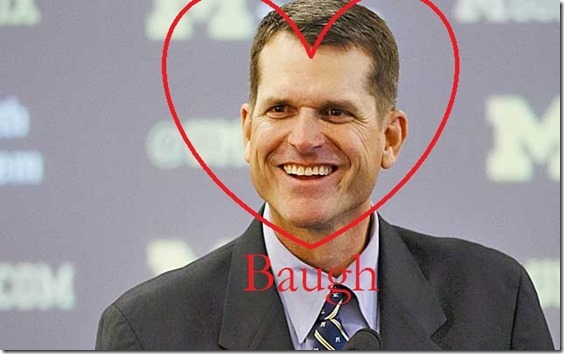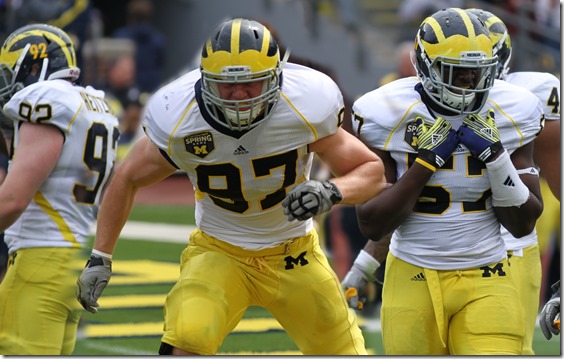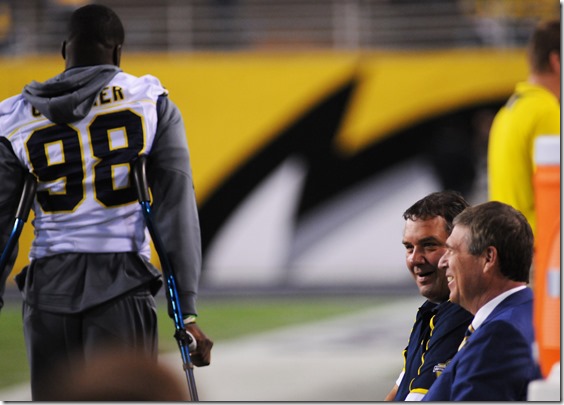brady hoke needs to coach better
I realize Strobel got one. Find a better photo then, pickers of nits.
This has to be talked about. Hoke left a roster that was in relatively good shape considering all the highly rated players who had to stick through some awful program degradation. He signed good classes, and those classes have by and large stuck around and fulfilled their academic duties. But an inordinate amount of them inexplicably didn't redshirt, and because of this there are some holes on the horizon.
I'm sure there are explanations in many of these cases that we are not party to. It's only the sheer volume of head-scratching non-redshirts under Hoke that gives us reason to call all of them into question. Like how I'm sure there are legit medical hardship waivers that occur at Alabama but [graph].
Some guys the coaches were forced to play early, and there's no need to discuss them beyond a mention as such, e.g. Jabrill Peppers. Mason Cole outcompeted a pile of guys to start at left tackle last season. That sort of thing gets a full pass. Beyond that, I've broken each Hoke class into categories of increasing argh:
- WTF. Wasting redshirts on special teams and dime back when last year's dime back is on the bench.
- Pick ONE. Needed bodies at this position, but not all the bodies. Battles for 2nd on the depth chart should be resolved in time for the ultimate loser to have a 5th year as consolation.
- Need the dudes (and other things I don't blame on the coaches). Immediate starters or guys who played because Michigan sorely needed his body and his pulse at that position.
Names that should have redshirted are in red.
Class of 2011
Did you really need both, 2011? [Upchurch]
Hoke arrived to an offensive machine with two years of eligibility remaining, and a nightmare defense of guys who couldn't displace recent departures like Jonas Mouton, Ray Vinopal, Adam Patterson, Greg Banks, and James Rogers. The immediate need was obvious and Hoke rightfully set about recruiting freshmen who could fill those roles. So I'll give him a pass for some of it.
 |
| Hollowell's 2011 contribution was more than scooping up a fumbled kickoff against VT, but it was also more than Ray Taylor's. [Melanie Maxwell|AnnArbor.com] |
Wtf: None.
Pick ONE
Raymon Taylor and Delonte Hollowell. The year following the Never Forget defensive backfield, Hoke recruited five likely cornerbacks: Blake Countess, Raymon Taylor, Delonte Hollowell, Tamani Carter (redshirted, transferred before 2012), and Greg Brown (early enrollee, transferred before 2011 season). The roster still had J.T. Floyd, Courtney Avery and Terrence Talbott (left program summer before 2012 season), available. In a pinch, Troy Woolfolk could have converted back when Thomas Gordon won the free safety job. At least one, and probably two true freshmen would have to play.
It immediately became apparent that one would be Countess. So to fill out the two deep they would need to burn Taylor or Hollowell's shirt. Hollowell arrived as the quintessential Cass Tech mite corner. The guy was 164 pounds, but saw some action at dime back vs. Nebraska, and recovered the fumble at the end of the first half. Taylor had two tackles and a personal foul.
Brennen Beyer and Frank Clark. Going into the season Beyer was a SAM and Clark a WDE. The difference between those positions in Michigan's 4-3 under was not very great, particularly because when Beyer was inserted it was for a 5-2 look. The WDE's depth chart was Craig Roh and Jibreel Black; SAM was Jake Ryan and Cam Gordon. The reason I say one would have played anyway is the rush end position has a lot rotation, and Black was already the starter in the nickel formation.
There wasn't much to differentiate the two in aggregate play; Beyer was the more consistent, Clark the more explosive. The coaches chose to have them compete through the year instead of preserving one. Had they done so Beyer was the obvious choice despite Clark's higher ceiling. Beyer was smaller and Michigan had Roh to be a more solid edge defender, but only Clark to be a merchant of chaos (remember the Sugar Bowl interception). On the other hand Frank had a rough history before Glenville, and could have used an adjustment season. Either way he would have been dismissed after last year's incident.
Needed dudes etc.
Blake Countess and Desmond Morgan won starting jobs on the 2011 defensive reclamation project. They also both would lose a season to injury so we have them back yay. Thomas Rawls I'm not broken up about, though he will be a pretty good MAC back this year. RBs usually have most of the "it" they ever will as freshmen, and if they do become long-term starters the toll it takes on their bodies means they're often better off moving through their careers early. A redshirt year can make a guy a better blocker, or put some distance between a good back and his heir, or let a smaller guy fill in. Matt Wile is a special pass even though they wasted his redshirt on kickoff duties (and punting during Hagerup's first suspension). I learned recently that Wile made it clear from the start he intended to graduate in four years and do engineering things.
[Save your anger for after the jump.]
Okay
Good Morning (Afternoon in Ann Arbor) MGoBlog Team,
In the spirit of the upcoming holiday, the attached picture was being passed around by the 49ers fans here in my office. One had the insight to share with me.
Go Blue.

I want to see a version of this with the MVictors glare photo.
Not at all timely response to Super Bowl question.
Brian,
You briefly mentioned how you believe Belichick not using a timeout at the end of the Super Bowl was a colossal overlooked mistake, and that the ends don't justify the means. In almost all cases I agree with you on coaches' inability to properly use timeouts (e.g. Hoke giving up a free hail mary). However, in this particular case, I disagree and I think the statistics and "feels" may bear out that Belichick didn't necessarily just get lucky.
Everyone knew that, at some point, Lynch was going to get the ball. With only one timeout left, Belichick knew that Seattle couldn't run it three straight times. In addition, Lynch had not been very good, going only 45% successful in short yardage situations all season, and 1/5(!) at goal to go from the 1. Belichick had to know that, and was potentially making a statistical gamble on being able to stop the run there. There is also something to be said in the "feels" category with putting pressure on the other
team to make a decision they may not otherwise make. It was also made clear by Butler that they were ready for that exact situation. Belichick knew they could defend it. I think even though it may appear that Belichick got lucky, he in fact knew exactly what he was doing. It may look like high risk, but in fact the season statistics and his preparation tell me that he knew the odds were in his favor by letting the clock run and limiting Seattle's choices.Thanks, and I love the blog as well as discussions like this.
-Kyle (Carolina Blue)
I think that's dubious at best. Seattle snapped the ball on second down with a timeout and 26 seconds after having run the clock down from just under a minute. Seattle has the option to run on either second or third down. By not calling timeout you get to impose that constraint on their playcalling.
But that's all, and that's not much. You cite some stats that have been floating around; those are not serious. (Five attempts? Cumong man.) Football Outsiders' OL rankings have Seattle the #2 team in the league in their "power success" stat, which is defined like so:
Percentage of runs on third or fourth down, two yards or less to go, that achieved a first down or touchdown. Also includes runs on first-and-goal or second-and-goal from the two-yard line or closer.
Lynch and Seattle had in fact been excellent at punching the ball in, and forcing a pass is a good idea. You give up some expectation when you throw on the doorstep of the end zone.
Meanwhile, the Patriots were dead last with an identical rate: 81% of the time Seattle tried a short conversion they got it; 81% of the time the Patriots tried to stop one they failed. Even leaving aside the passing down, 19% squared is about 4%. Without a miracle—the first goal-line interception thrown by an NFL team all year—the Patriots go home losers. How likely is that miracle? Not likely. Russell Wilson had seven interceptions on 495 throws this year.
Your win percentage is unbelievably grim in the situations the Pats put themselves in. But how grim is it
- down three with a minute left with a TO
- on your 20
- with a unanimous first-ballot HOF QB
Not nearly as grim, I think.
[After the JUMP: demoralizing: we're experts]
What about this do you think can be saved? [Glanzman]
Ace: There's a very good chance this is moot after a beatdown this weekend, so it's now or never for this question. If you ran the athletic department, is there anything Brady Hoke could do the rest of this season that would convince you to keep him around for another year? If so, what would he have to accomplish over the rest of the year?
--------------------------
BiSB: There is absolutely room for Brady Hoke to save his job. And it absolutely won't happen.
People get WAY too caught up in wins and losses. Devin Funchess was right: wins are just a statistic. Any time a coach is on the "hot seat," the offseason features constant and breathless blathering about "how many wins Coach X needs to keep his job," as if win totals by themselves tell us everything. Hoke's problem isn't that Michigan is 3-4. The problem isn't that Michigan has lost 10 of its last 15. The problem is that Michigan has been bad at football. The records are merely a symptom of being bad at football. You look at the guy trailing by 10 meters at the halfway point of a 100 meter dash, you don't say to yourself "he's going to lose because he has too much ground to make up." You say "he's going to lose because he isn't as fast as the other guys."
And that is why Brady Hoke will not keep his job. The football team he has assembled is not good, and has shown no signs of improvement over the last four years. Some people got excited last week because "a win is a win," and ignored the fact that Michigan displayed plenty of the same crippling weaknesses that have led it here. At some point, as they say, "you are who you are." The flaws with this team are not small, technical issues. They have deep, fundamental, systematic problems. They can't block. They can't get open. They flat-out can't play the coverage scheme they have been trying to play. They can't... uh... score points. Their special teams, as a whole, are bad. Michigan is just bad.
You don't throw away a coach who is moving in the right direction because he took momentary detour into Derpville. If Hoke can turn this team into the kind of team that can beat Michigan State and Ohio State and (sigh) Maryland, then sure, why not keep him. But if he could do that, we probably would have seen evidence of it by now.
[After the jump: votes of confidence?]



84